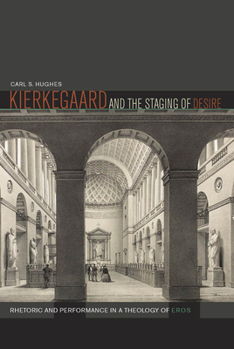Kierkegaard and the Staging of Desire: Rhetoric and Performance in a Theology of Eros
Theology in the modern era often assumes that the consummate form of theological discourse is objective prose--ignoring or condemning apophatic traditions and the spiritual eros that drives them. For too long, Kierkegaard has been read along these lines as a progenitor of twentieth-century neo-orthodoxy and a stern critic of the erotic in all its forms. In contrast, Hughes argues that Kierkegaard envisions faith fundamentally as a form of infinite,...
Format:Hardcover
Language:English
ISBN:0823257258
ISBN13:9780823257256
Release Date:July 2014
Publisher:Fordham University Press
Length:272 Pages
Weight:1.35 lbs.
Dimensions:0.9" x 6.1" x 9.3"
Customer Reviews
0 rating





